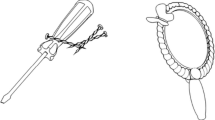Abstract
The ability of males and females to use visual-spatial imagery as a facilitator of symbolic motor skill acquisition was investigated. Subjects, ordered by gender into control and mental imagery groups, performed 15 trials on a mirrored drawing task. The results indicated that, although both male and female mental imagery groups performed the task more skillfully than the control groups, the male mental imagery group scores over the early stages of performance were better as compared to the female mental imagery group scores. This difference was eradicated during the latter stages of performance. The findings, in addition to supporting the positive effects of mental imagery, lend support to the hypothesis that sex-related differences in selected visual-spatial tasks may be amendable through training followed by practice.
Similar content being viewed by others
References
Bock, R., & Kolakowski, D. Further evidence of sex-linked major gene influence on human spatial visualizing ability. American Journal of Human Genetics, 1973, 25, 1–14.
Burnett, S., Lane, D., & Dratt, L. Special visualization and sex differences in quantitative ability. Intelligence, 1979, 3, 345–354.
Connor, J., Schackman, M., & Serbin, L. Sex-related differences in response to practice on a visual-spatial task and generalization to a related task. Child Development, 1978, 49, 24–29.
Dillon, W., & Goldstein, M. Multivariate analysis: Methods and application. New York, N.Y. Wiley & Sons, 1984.
Hummell, T. J., & Sligo, J. R. Empirical comparison of univariate and multivariate analysis of variance problems. Psychological Bulletin, 1971, 76(1), 49–57.
Maccoby, E. E., Jacklin, C. N. The psychology of sex differences. Stanford, CA: Stanford University Press, 1974.
Richardson, A. Mental practice: A review and discussion (Part 2). Research Quarterly, 1967, 38, 263–273.
Ryan, E. E., & Simons, J. Cognitive demand, imagery, and frequency of mental rehearsal as factors influencing acquisition of motor skills. Journal of Sport Psychology, 1981, 3, 35–45.
Sherman, J. A. A problem of sex differences in space perception and aspects of intellectual functioning. Psychological Review 1967, 74, 290–299.
Sherman, J. A. On the psychology of women: A survey of empirical studies. Springfield, IL: C. C. Thomas, 1971.
Sherman, J. A. Social values, femininity, and the development of female competence. Journal of Social Issues, 1976, 32(1), 181–195.
Smyth, M. M. The role of mental practice in skill acquisition. Journal of Motor Behavior, 1975, 7(3), 199–206.
Weinberg, R. S. The relationship between mental preparation strategies and motor performance: A review and critique. Quest, 1982, 33(20), 195–213.
Wrisberg, C., & Ragsdale, M. Cognitive demand and practice level: Factors in the mental rehearsal of motor skills. Journal of Human Movement Studies, 1979, 5, 201–208.
Author information
Authors and Affiliations
Rights and permissions
About this article
Cite this article
Koslow, R.E. Sex-related differences and visual-spatial mental imagery as factors affecting symbolic motor skill acquisition. Sex Roles 17, 521–527 (1987). https://doi.org/10.1007/BF00287733
Issue Date:
DOI: https://doi.org/10.1007/BF00287733




